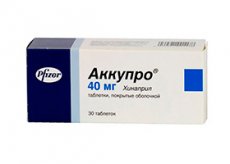Medical expert of the article
New publications
Preparations
Accupro
Last reviewed: 03.07.2025

All iLive content is medically reviewed or fact checked to ensure as much factual accuracy as possible.
We have strict sourcing guidelines and only link to reputable media sites, academic research institutions and, whenever possible, medically peer reviewed studies. Note that the numbers in parentheses ([1], [2], etc.) are clickable links to these studies.
If you feel that any of our content is inaccurate, out-of-date, or otherwise questionable, please select it and press Ctrl + Enter.

Accupro is a medicine from the ACE inhibitor group.
Indications Accupro
It is used for treatment of:
- elevated blood pressure values, which have a renovascular form;
- renal failure developing due to scleroderma;
- CHF;
- in the period after myocardial infarction – in combination with other medications.
Release form
The drug is released in tablet form.
Pharmacodynamics
The active ingredient of the drug is quinapril. The therapeutic effect is based on competitive blocking of ACE activity and reducing the rate of conversion of angiotensin-1 to angiotensin-2.
The drug increases the body's tolerance to stress and cardiac output, and also reduces afterload and constriction pressure within the pulmonary capillaries.
Long-term treatment results in reversal of myocardial hypertrophy in people with elevated blood pressure and, in the case of ischemic or damaged myocardium, improved blood flow.
The drug can potentiate coronary circulation and blood flow within the kidneys, as well as reduce platelet aggregation.
Pharmacokinetics
After a single use of the drug, the medicinal effect appears after 60 minutes. The full medicinal effect is observed over several weeks of therapy.
Dosing and administration
The tablets must be taken orally. The initial dose for elevated blood pressure is 10 mg (one or two doses). If this dose is ineffective, it is gradually increased to 20 mg (over the course of 21 days).
On average, the dose of the drug is approximately 10-20 mg per day. The maximum permissible dosage per day is 80 mg.
Elderly people, as well as those who suffer from kidney disease, need to reduce the daily dosage to 5 mg.
Use Accupro during pregnancy
Accupro should not be administered to pregnant women.
Contraindications
Main contraindications:
- the presence of hypersensitivity to ACE inhibitors, as well as quinapril;
- breastfeeding period.
Caution and prior consultation with a doctor are required in the following cases:
- idiopathic Quincke's edema of hereditary origin;
- pathology of cardiovascular or cerebrovascular nature;
- diabetes mellitus;
- common autoimmune diseases of the connective tissues that have a severe degree of expression (such as SLE and scleroderma);
- aortic stenosis;
- hyperkalemia;
- arterial stenosis in the area of 2 kidneys;
- in the period following operations during which kidney transplantation was performed;
- diseases affecting the liver or kidney system;
- elderly people;
- vomiting or diarrhea.
Side effects Accupro
The use of the drug can cause various negative symptoms:
- dysfunction of the cardiovascular system: orthostatic hypotension, myocardial infarction, ischemic stroke, progression of Raynaud's syndrome, tachycardia and worsening of coronary heart disease;
- problems with the functioning of the nervous system: depression, fainting, severe fatigue, mood lability, sensory disturbances, headaches, sleep problems, paresthesia in the extremities, dizziness, as well as a feeling of confusion and asthenia;
- disorders of the sensory organs: tinnitus, loss of taste, vestibular disorders and problems with visual perception;
- digestive disorders: pancreatic dysfunction, constipation, dry mouth, diarrhea, pain in the epigastric region, loss of appetite, liver disease, increased levels of liver enzymes and hyperbilirubinemia;
- problems with hematopoietic function: development of anemia, pancyto-, leuko- or neutropenia, as well as agranulocytosis;
- respiratory disorders: bronchitis, bronchial spasms, runny nose, sinusitis and dry cough;
- symptoms affecting the urogenital system: delayed urination, decreased potency, increased urea levels, hypercreatininemia and proteinuria;
- Others: glossitis, hyponatremia, MEE, itching, signs of allergy, hyperkalemia, photosensitivity, myalgia, alopecia, exfoliative dermatitis, hyperthermia and arthralgia.
 [ 1 ]
[ 1 ]
Overdose
Intoxication causes a significant decrease in blood pressure, the development of dizziness or a feeling of weakness, as well as visual disturbances.
Symptomatic measures are required to eliminate the symptoms.
Interactions with other drugs
The medication potentiates the effect of ethyl alcohol.
Use together with immunosuppressants, allopurinol, as well as procainamide and cytostatics increases the likelihood of leukopenia.
The drug enhances the antidiabetic effect of sulfonylurea and its derivatives, as well as insulin.
Diuretics, opiates, general anesthetics and antihypertensive drugs potentiate the hypotensive effect of Accupro.
The use of NSAIDs or table salt leads to a decrease in the drug's effectiveness.
Potassium-sparing diuretics (including amiloride and triamterene with spironolactone) and potassium medications lead to the development of hyperkalemia.
When using estrogens, a decrease in the antihypertensive properties of the drug is observed due to fluid retention in the body.
When combined with drugs that suppress bone marrow function, the likelihood of developing neutropenia or agranulocytosis increases.
 [ 2 ]
[ 2 ]
Storage conditions
Accupro should be kept out of reach of children. Temperature values should not exceed 25°C.
Shelf life
Accupro is approved for use within 36 months from the date of release of the therapeutic agent.
Analogues
Analogues of the drug are the drugs Akurenal and Quinaphar.
Attention!
To simplify the perception of information, this instruction for use of the drug "Accupro" translated and presented in a special form on the basis of the official instructions for medical use of the drug. Before use read the annotation that came directly to medicines.
Description provided for informational purposes and is not a guide to self-healing. The need for this drug, the purpose of the treatment regimen, methods and dose of the drug is determined solely by the attending physician. Self-medication is dangerous for your health.

